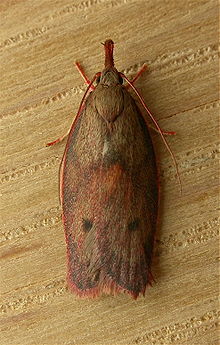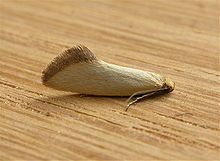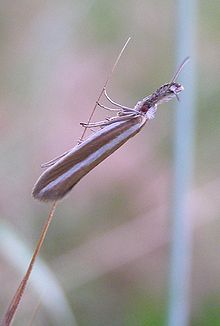- Oecophorinae
-
Oecophorinae 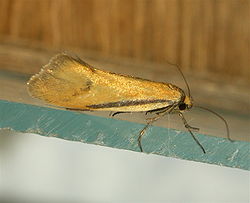
Adult of Philobota arabella or a related species,
Aranda (Australia)Scientific classification Kingdom: Animalia Phylum: Arthropoda Class: Insecta Order: Lepidoptera Suborder: Glossata Infraorder: Heteroneura Division: Ditrysia Superfamily: Gelechioidea Family: Oecophoridae Subfamily: Oecophorinae
Bruand, 1851Genera Numerous, see text
Synonyms Chimabachidae Heinemann, 1870
Chimabachinae
Deuterogoniidae
Deuterogoniinae
Enicostominae Heslop, 1938
Peleopodidae
Peleopodinae
Philobotidae
Philobotinae
(but see text)The Oecophorinae are the nominate subfamily of moths in the concealer moth family (Oecophoridae). They are part of the insufficiently studied superfamily Gelechioidea, and like their relatives, the circumscription of this taxon is disputed.[1]
In the approach followed here, the Oecophoridae are expanded to include several lineages formerly placed in the Elachistidae or considered independent gelechioid families. As regards the Oecophorinae, the proposed concealer moth subfamilies Chimabachinae, Deuterogoniinae, Peleopodinae and Philobotinae are included here pending further study of the affiliations of their genera. They were also often treated as independent families (Chimabachidae, Deuterogoniidae, Peleopodidae and Philobotidae) by those who followed a "splitting" approach. In general, the delimitation of the Oecophorinae versus the Amphisbatinae, Depressariinae and Hypertrophinae has been the most contested issue, though the uncertain placement of the Xyloryctidae versus the concealer moths (into which they might belong as subfamily) has also been a considerable stumbling block.[1]
Numerous attempts have been made to divide the Oecophorinae into tribes, such as Carcinini, Crossotocerini, Denisiini, Herrichini, Oecophorini, Peleopodini and Pleurotini. Also placed here under this scheme are the Cacochroini and Orophiini, which otherwise were included in the Depressariinae (but usually only when these were elevated to full family rank). Most of the proposed tribes were based on phenetic or qualitative analyses, if not merely on the whim of the entomologists that established them, and no robust evolutionary scenario has been established for the different lineages of Oecophorinae. The groups around the genus Peleopoda (the former Peleopodinae) and of course the type genus Oecophora are generally recognized to be well distinguished from each other, but no satisfying arrangement has been found for the bulk of the (presumed) oecophorine genera. Hence, no subdivision into tribes is attempted here.[1]
Selected genera
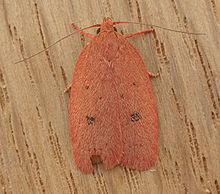 Adult Garrha pudica, Aranda (Australia)
Adult Garrha pudica, Aranda (Australia)
The following genera (with some notable species also listed) are usually held to belong to the Oecophorinae, at least in the delimitation used here. Still, placement of few genera is completely certain (see above), and many – in particular monotypic genera – may not be valid at all. New oecophorine genera are also being described frequently:[1]
- Acanthodela Common, 1994
- Acanthodela protophaes
- Acantholena Common, 1997
- Acedesta Turner, 1940
- Acmotoma Common, 1994
- Acolasta Meyrick, 1902
- Acorotricha Meyrick, 1913
- Actenotis Turner, 1935
- Aeolothapsa Common, 1997
- Ageletha Common, 1994
- Ageletha hemiteles – Webbing Moth
- Aglaodes Turner, 1898
- Airogephyra Common, 2000
- Alabonia
- Allognoma Common, 1997
- Analcodes Turner, 1947
- Ancistromorpha Common, 1994
- Ancistroneura Turner, 1947
- Anomozancla Turner, 1936
- Anthocoma Turner, 1946
- Antiopala Meyrick, 1889
- Antipterna Meyrick, 1916
- Aplota
- Arachnographa Meyrick, 1914
- Archaereta Meyrick, 1914
- Aristeis Meyrick, 1883
- Artiastis Meyrick, 1889
- Ascetoloba Common, 1997
- Ashinaga Matsumura, 1929 (previously in monotypic family Ashinagaidae)
- Aspasiodes Turner, 1944
- Ataleida Common, 2000
- Atalopsis Common, 2000
- Atelosticha Meyrick, 1883
- Atheropla Meyrick, 1883
- Atheropla decaspila
- Atholosticta Common, 1997
- Baiocystis Common, 1994
- Baioglossa Common, 2000
- Barea Walker, 1864
- Barea codrella – Barea Moth
- Barea consignatella
- Barea melanodelta
- Basiplecta Common, 1994
- Bathrosterra Common, 1994
- Batia Stephens, 1834
- Batia lambdella
- Batia lunaris – Lesser Tawny Crescent
- Batia unitella
- Bisigna Toll, 1956[verification needed]
- Bisigna procerella
- Borkhausenia
- Boroscena Common, 1997
- Brachynemata Meyrick, 1883
- Brymblia Hodges, 1974
- Buvatina Leraut, 1984
- Cacochroa Heinemann, 1870
- Cacochroa permixtella
- Callimima Turner, 1935
- Carcina Hübner, 1825[verification needed]
- Carcina quercana
- Carolana Clarke, 1941
- Casmara Walker, 1863
- Catacometes Common, 1994
- Catadoceta Common, 2000
- Cephalispheira Bruand, 1850[verification needed]
- Chezala Walker, 1864
- Chioneocephala Common, 2000
- Chrysonoma Meyrick, 1914
- Cirrograpta Common, 2000
- Cirromitra Common, 2000
- Clonitica Meyrick, 1914
- Cnecophora Common, 1996
- Coelognatha Common, 2000
- Coeranica Meyrick, 1883
- Coesyra Meyrick, 1883
- Compsotropha Meyrick, 1883
- Conobrosis Common, 1997
- Copidostola Lower, 1897
- Corethropalpa Turner, 1896
- Corocosma Meyrick, 1927[verification needed]
- Corynotricha Common, 2000
- Coryphoscola Common, 1994
- Cosmaresta Common, 1994
- Crassa
- Crepidosceles Meyrick, 1883
- Crossophora
- Crossotocera Zerny, 1930
- Cryptotypa Common, 1997
- Cyphacma Meyrick, 1915
- Dasystoma Curtis 1833
- Dasystoma salicella – Blueberry Leafroller
- Decantha Busck, 1908
- Delexocha Common, 1997[verification needed]
- Delophanes Turner, 1947
- Denisia
- Deuterogonia Rebel 1901
- Deigmoesta Common, 1994
- Diapatela Common, 1997
- Diaphanta Common, 1996
- Diaphorodes Turner, 1946
- Diasceta Common, 2000
- Diocrogephyra Common, 2000
- Dissoloba Common, 1997
- Diplogephyra Common, 1997
- Diplogrypa Common, 1997
- Disselia Meyrick, 1883
- Diurnea Haworth 1811
- Dolopsis Common, 2000
- Drepanocera Common, 1997
- Durrantia Busck, 1908
- Dysthreneta Turner, 1947
- Echinobasis Common, 1994
- Echinocosma Common, 1997
- Echinognatha Common, 2000
- Eido Chambers, 1875
- Elaeonoma Meyrick, 1914
- Elaphromorpha Turner, 1936
- Enchocrates Meyrick, 1883
- Enchronista Meyrick, 1914
- Endeolena Common, 1994
- Endrosis – White-shouldered House Moth
- Enlopholepis Common, 2000
- Enoplidia Common, 1994
- Eochrois Meyrick, 1886
- Epicallima Dyar, 1903
- Epicurica Meyrick, 1914
- Epithymema Turner, 1914
- Eratophyes Diakonoff, 1975
- Ereiconastes Common, 2000
- Eremnotypa Common, 1994
- Eremnozona Common, 2000
- Ericibdela Common, 1994[verification needed]
- Ericibdela delotis
- Ericrypsina Common, 1997
- Eridolera Common, 2000
- Erythrisa Common, 1997
- Erythrobapta Common, 2000
- Esperia
- Euchaetis Meyrick, 1883
- Euchaetis rhizobola
- Eulachna Meyrick, 1883
- Eulechria Meyrick, 1883
- Eulechria encratodes
- Eulechria subpunctella
- Euphiltra Meyrick, 1883
- Eusemocosma Common, 1997[verification needed]
- Eusemocosma pruinosa
- Euthictis Meyrick, 1914
- Exarsia Meyrick, 1914
- Fabiola Busck, 1908
- Garrha Walker, 1866
- Garrha limbata
- Garrha ocellifera
- Goidanichiana Agenjo, 1976
- Guestia Meyrick, 1889
- Gymnocoila Common, 1997
- Habrochlanis Common, 2000
- Habroscopa Meyrick, 1914
- Hadrocheta Common, 1994
- Hadrognatha Common, 1997
- Haplodyta Meyrick, 1883
- Hapaloteucha Meyrick, 1914
- Harpella
- Heliocausta Meyrick, 1883
- Heloscopa (formerly in Tineidae)
- Hemibela Turner, 1894
- Hemibela callista
- Herrichia Staudinger, [1871]
- Hesperenoeca Common, 2000
- Hesperoptila Meyrick, 1902
- Heterochyta Meyrick, 1906
- Heteroptolis Meyrick, 1914
- Heteroteucha Common, 1994
- Heteroteucha parvula
- Heteroteucha translatella
- Heterozyga Meyrick, 1883[verification needed]
- Heterozyga coppatias
- Hofmannophila – Brown House Moth
- Holoscolia Zeller, 1839
- Hoplomorpha Turner, 1916
- Hoplomorpha camelaea
- Hoplostega Meyrick, 1914
- Horridopalpus Hannemann 1953 (formerly in Depressaria)
- Hybocrossa Turner, 1917
- Idioglossa Walsingham, 1881
- Idioxantha Common, 1994
- Idiozancla Turner, 1936
- Inga Busck, 1908
- Inga sparsiciliella – Black-marked Inga Moth
- Ioptera Meyrick, 1883
- Ironopolia Common, 1994
- Ironopolia sobriella
- Ischnomorpha Turner, 1937
- Isomoralla Common, 1997
- Isomoralla eriscota
- Izatha Walker, 1864
- Joonggoora T.P.Lucas, 1901
- Kasyniana Vives, 1986
- Lamproxantha Common, 1994
- Lasiocosma Common, 2000
- Laxonoma Meyrick, 1914
- Leimmatonca Common, 2000
- Leipochlida Common, 2000
- Leistomorpha Meyrick, 1883
- Lepidotarsa Meyrick, 1883
- Leprocosma Common, 2000
- Leptocopa Meyrick, 1918
- Leptocroca Meyrick, 1883
- Leucorhabda Common, 1994
- Limothnes Turner, 1935
- Linosticha Meyrick, 1883
- Liocnema Turner, 1941
- Liozancla Turner, 1919
- Lonchoptena Common, 2000
- Locheutis Meyrick, 1883
- Lophopepla Turner, 1896
- Machaeritis Meyrick, 1883
- Machetis Meyrick, 1883
- Macronemata Meyrick, 1883
- Macrophara Turner, 1946
- Martyringa Busck, 1902
- Mathildana Clarke, 1941
- Meioglossa Common, 2000
- Melanoima Common, 2000
- Mermeristis Meyrick, 1915
- Merocroca Common, 1997[verification needed]
- Metalampra
- Metaphrastis Meyrick, 1907
- Micramicta Common, 2000
- Microbela Meyrick, 1883
- Microlocha Meyrick, 1914
- Micropeteina Common, 2000
- Mimobrachyoma Lower, 1902
- Mionolena Common, 1994
- Myrascia Common, 1977
- Nemepeira Common, 2000
- Neosigala Turner, 1917
- Nephogenes Meyrick, 1883
- Ochlogenes Meyrick, 1883
- Ochropolia Common, 2000
- Ochyrolopha Common, 2000
- Ocystola Meyrick, 1885
- Oecophora
- Oenochroa Meyrick, 1883
- Olbonoma Meyrick, 1914
- Olenacantha Common, 1997
- Oligoloba Common, 1994
- Oncolapara Common, 2000
- Oncomerista Common, 2000
- Opsitycha Meyrick, 1914
- Orescoa Turner, 1927
- Oresitropha Turner, 1927
- Orophia Hübner 1825
- Orthiastis Meyrick, 1914
- Oxythecta Meyrick, 1883
- Ozotrypetes Common, 2000
- Pachybela Turner, 1917
- Pachyceraia Common, 2000
- Palimmeces Turner, 1916
- Paneutricha Common, 1994
- Pantogymna Common, 1997
- Pararsia Turner, 1939
- Parergophela Common, 1997
- Parocystola Turner, 1896
- Parocystola acroxantha – Ruddy Streak
- Pauronota Lower, 1901
- Pedois Lower, 1894
- Pelinoema Common, 1997
- Pellopsis Common, 1997
- Periallactis Meyrick, 1902
- Periorycta Meyrick, 1922
- Petalanthes Meyrick, 1883
- Phaeosaces Meyrick, 1885
- Phauloglossa Common, 1997
- Phanerozancla Turner, 1935
- Phauloplana Common, 2000
- Philobota Meyrick, 1883
- Philobota lysizona
- Philobota partitella
- Philobota stella
- Phloeocetis Turner, 1936
- Phloioletes Common, 2000
- Pholeutis Meyrick, 1906
- Phriconyma Meyrick, 1883
- Phryganeutis Meyrick, 1884
- Phryganeutis cinerea
- Phyllophanes Turner, 1896
- Phytotrypa Common, 1994
- Phyzanica Turner, 1917
- Piloprepes Meyrick, 1883
- Piloprepes anassa
- Piloprepes antidoxa
- Placocosma Meyrick, 1883
- Placocosma resumptella
- Platoloncha Common, 1997
- Platyphylla Turner, 1946
- Plectobela Common, 1994
- Plectobela zanclotoma
- Pleurota Hübner, 1825
- Pleurota bicostella
- Poliorhabda Common, 1994
- Polix Hodges, 1974
- Polyeucta Turner, 1917
- Prepalla Common, 1997
- Prepocosma Common, 1997
- Prionocris Common, 1994
- Prodelaca Common, 1994
- Prodelodes Common, 1997
- Proteromicta Meyrick, 1889
- Protomacha Meyrick, 1883
- Psaltriodes Meyrick, 1902
- Psarophorca Common, 2000
- Psaroxantha Common, 1994
- Psaroxantha calligenes
- Pseudocryptolechia Lvovky, 2001
- Pseudoecophora Staudinger, 1899
- Pseudotheta Clarke, 1947
- Ptochosaris Meyrick, 1906
- Ptyoptila Turner, 1946[verification needed]
- Ptyoptila matutinella
- Pycnocera Turner, 1896
- Pycnozancla Turner, 1917
- Pyrgoptila Meyrick, 1889
- Rhadinoloba Common, 1994
- Rhoecoceros Turner, 1940
- Saphezona Common, 1994
- Saropla Meyrick, 1883
- Satrapia Meyrick, 1883
- Scatochresis Common, 1997
- Schiffermuelleria
- Sclerocheta Common, 1994
- Sclerocris Common, 1997
- Scoliocheta Common, 2000
- Scotodryas Turner, 1932
- Sphyrelata Meyrick, 1883
- Stenoptena Common, 2000
- Stereocheta Common, 1997
- Stereoloba Common, 1994
- Sthenozancla Turner, 1941
- Stictochila Common, 1994
- Stictopolia Common, 1997
- Sympoecila Common, 2000
- Syncometes Common, 2000
- Syringoseca Common, 1994
- Syringoseca rhodoxantha
- Syscalma Meyrick, 1920
- Tachystola Meyrick, 1914[verification needed]
- Tachystola acroxantha
- Tanycaula Common, 1997
- Tanyzancla Meyrick, 1918
- Teerahna T.P.Lucas, 1901
- Telanepsia Turner, 1933
- Telocharacta Common, 1997
- Temnogyropa Common, 1997
- Temnogyropa stenomorpha
- Thalerotricha Meyrick, 1883
- Thapsinotypa Common, 2000
- Thema Walker, 1864
- Thema macroscia
- Thema protogramma
- Thema psammoxantha
- Tingena Walker, 1864
- Tingena armigerella
- Tingena marcida
- Tisobarica Walker, 1864
- Tisobarica thyteria
- Tortricopsis Newman, 1856
- Tortricopsis euryphanella
- Tortricopsis pyroptis
- Tortricopsis semijunctella
- Tortricopsis uncinella
- Trachyxysta Meyrick, 1916
- Trachyzancla Turner, 1917
- Triacra Common, 2000
- Trichomoeris Meyrick, 1913
- Trinaconeura Turner, 1933
- Wingia Walsingham & Durrant, 1900
- Wingia aurata – Golden Leaf Moth
- Woorda T.P.Lucas, 1901
- Wullaburra T.P.Lucas, 1901
- Zacorus Butler, 1882
- Zelotechna Meyrick, 1914
- Zonopetala Meyrick, 1883
- Zonopetala clerota
- Zonopetala decisana
Several genera of Oecophoridae are of very unclear or highly disputed relationships. Among these, some have been theorized to belong in the Oecophoridae:
- Callimodes Leraut 1989
- Minetia Leraut, 1991
- Schiffermuellerina Leraut, 1989[verification needed]
- Schiffermuellerina grandis
- Zizyphia (formerly in Gelechiidae)
Also, it may be that some additional genera usually placed outside the Gelechioidea are actually Oecophorniae, too, e.g.:
- Leurophanes Turner, 1939 (usually in Plutellidae)
- Notodryas Meyrick, 1897 (usually in Epermeniidae)
- Trisyntopa Lower, 1918 (usually in Tineidae)
Footnotes
References
 Data related to Oecophorinae at Wikispecies See also Gelechioidea Talk page for comparison of some approaches to gelechioid systematics and taxonomy.
Data related to Oecophorinae at Wikispecies See also Gelechioidea Talk page for comparison of some approaches to gelechioid systematics and taxonomy.- Australian Biological Resources Study (ABRS) (2008): Australian Faunal Directory – Oecophorinae. Version of 2008-OCT-09. Retrieved 2010-APR-24.
- Fauna Europaea (FE) (2009): Gelechioidea. Version 2.1, 2009-DEC-22. Retrieved 2010-APR-22.
- Savela, Markku (2009): Markku Savela's Lepidoptera and some other life forms – Oecophorinae. Version of 2009-AUG-20. Retrieved 2010-APR-22.
Categories: - Acanthodela Common, 1994
Wikimedia Foundation. 2010.

